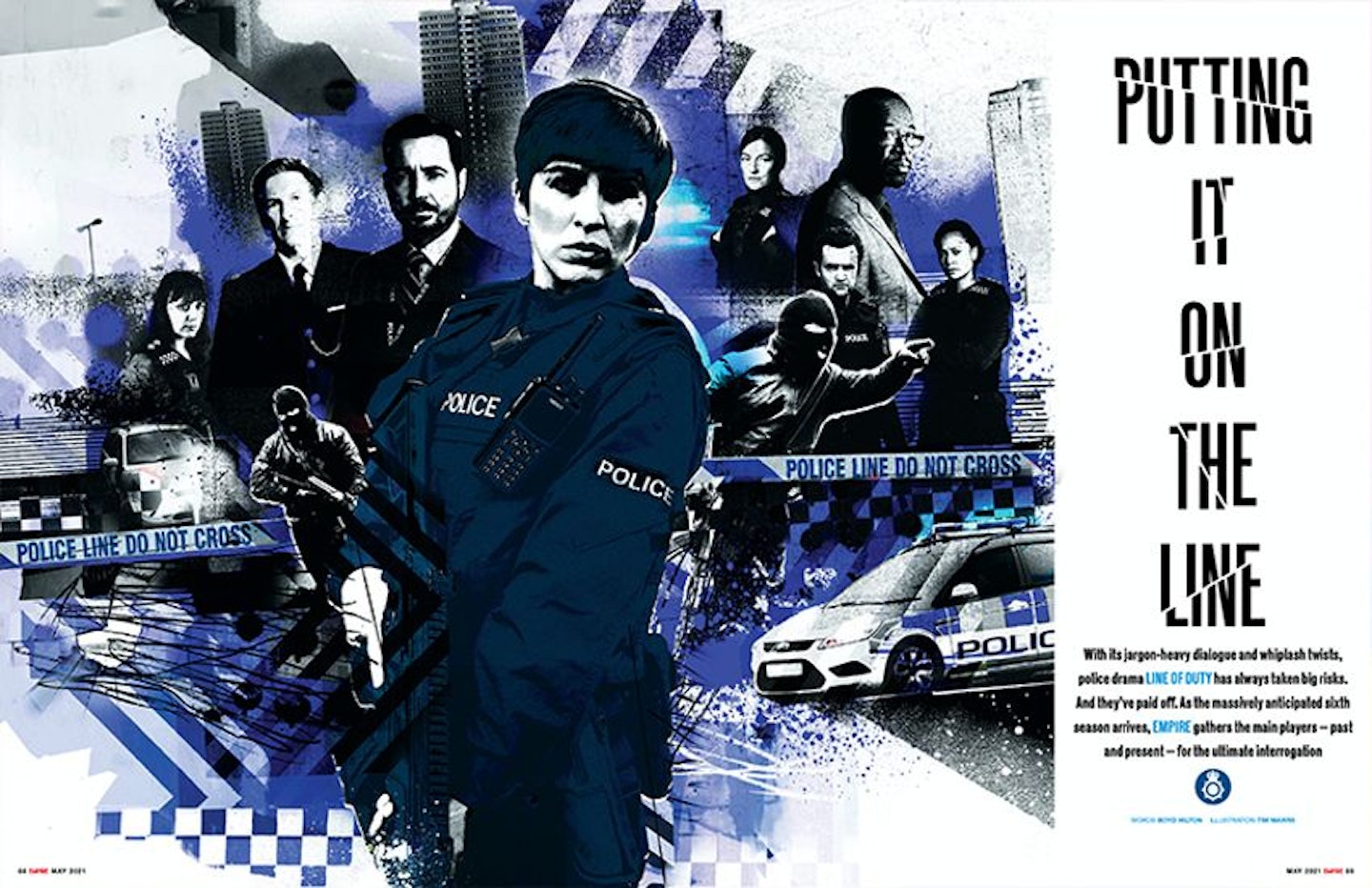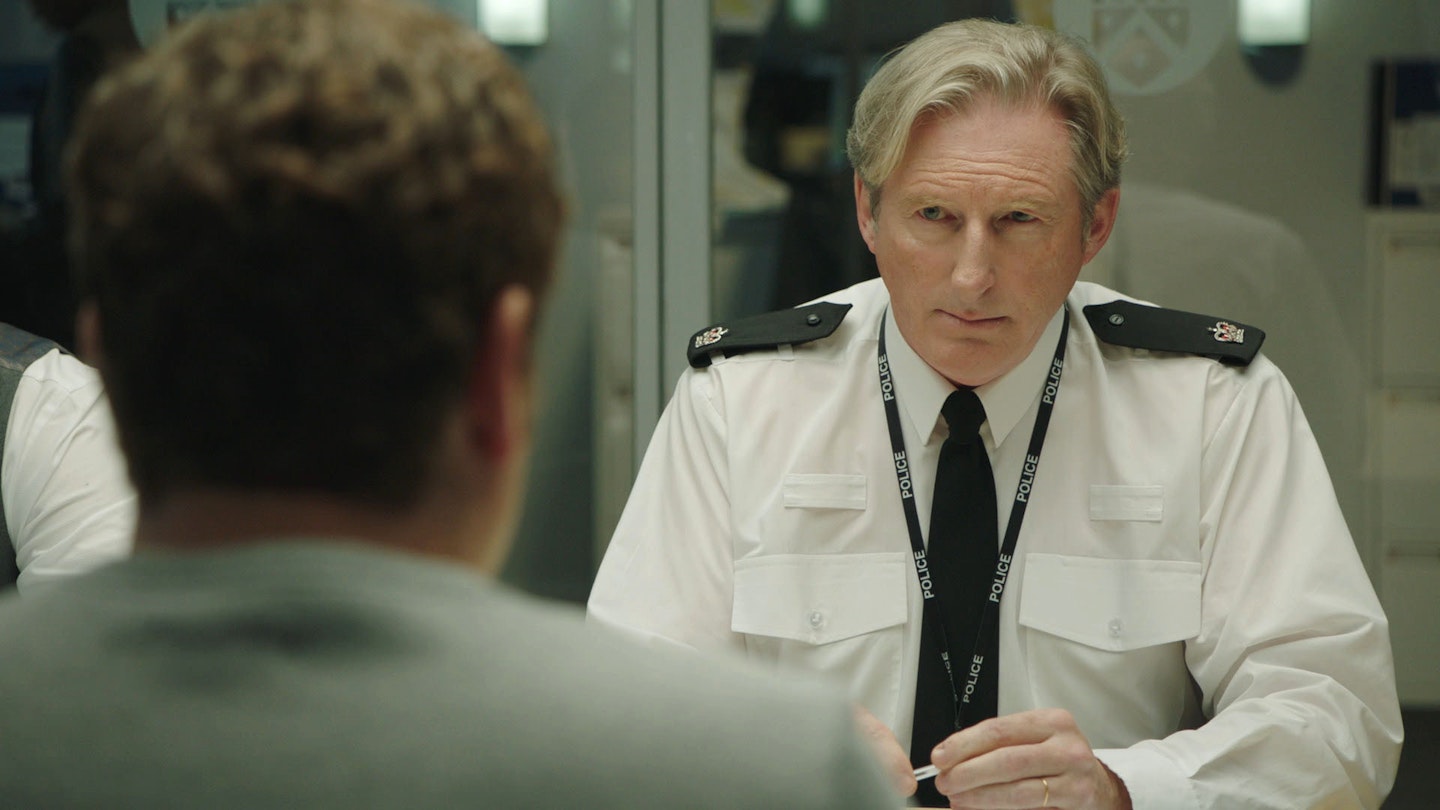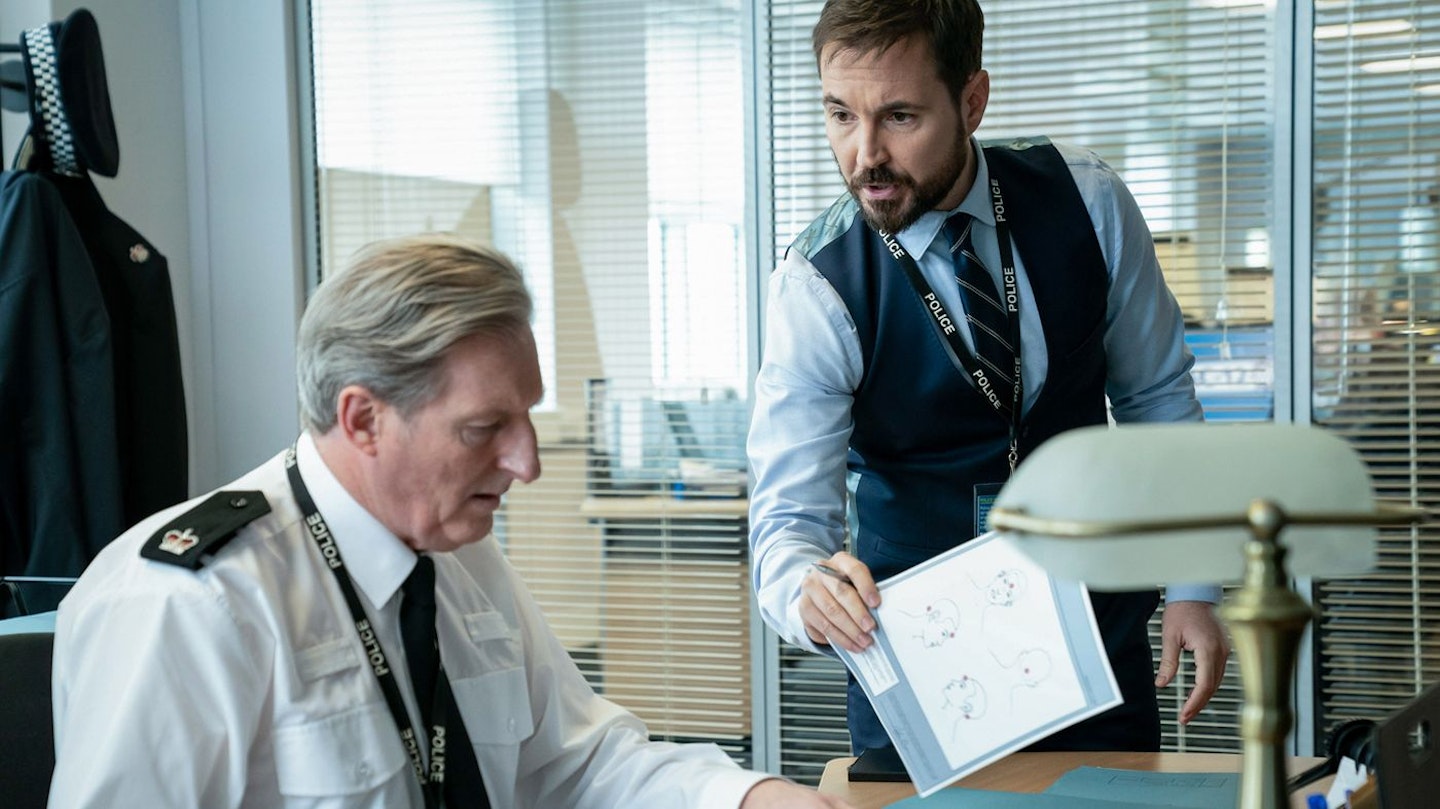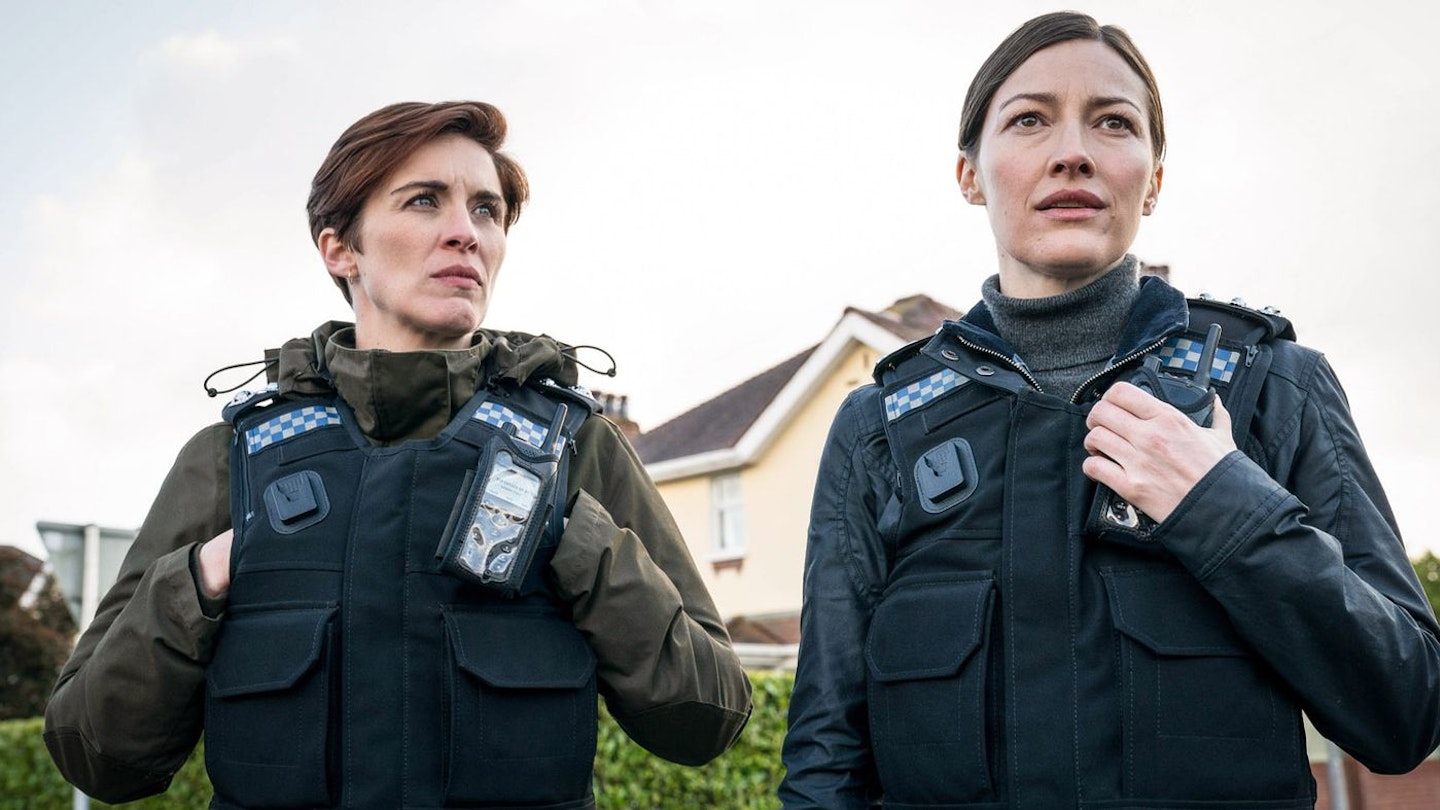This feature was originally published on 18 March 2021 in Empire Magazine's May issue. It therefore predates the Sunday finale.
With its jargon-heavy dialogue and whiplash twists, police drama Line Of Duty has always taken big risks. And they’ve paid off. As the massively anticipated sixth season arrives, Empire gathers the main players — past and present — for the ultimate interrogation.
When Line Of Duty began there was, it’s fair to say, little fanfare. Season 1 appeared on BBC Two in 2012, and with its edgy, frequently brutal exploration of police corruption, it built a decent audience of almost four million. Nine years later, on the eve of the sixth series airing, Line Of Duty is the BBC’s most popular returning drama, with 12.69 million gripped by the 2019 Series 5 finale.
It’s hard to know which of the show’s key ingredients is the main reason for this phenomenal, unprecedented rise. There’s the unique structure, in which each series is built round the investigation of a different antagonist, played by guest leads ranging from Lennie James in Series 1 to Series 6’s Kelly Macdonald, while an over-arching conspiracy narrative involving balaclava-wearing men and corrupt cops nicknamed ‘H’ and ‘the Caddy’ runs parallel. There’s the extraordinary trio who form the core AC-12 anti-corruption team, played by Adrian Dunbar, Vicky McClure and Martin Compston. They have a profound respect and perhaps even love for one another, even though at various times in the saga they’ve each come under suspicion of being, in police parlance, massively bent.
There are the stunning rug-pull jolts, like [spoiler alert] Series 3’s putative guest lead character, played by Danny Mays, dying at the end of his first episode. There’s the pace: each episode packs more story into 60 minutes than most TV dramas manage in six or eight hours. There’s the jargon, bewildering at first, but much beloved by fans, as we get to know the difference between the ‘UCO’ (undercover officers) and the ‘OCG’ (organised crime group). Finally, there are those infamous interview scenes; the epic confrontations between detectives and suspects that can stretch to 35 minutes.
To account for all these factors, we issued Regulation 15 notices to creator Jed Mercurio, core cast Dunbar, McClure and Compston, plus guest leads old (Daniel Mays) and new (Kelly Macdonald) on Zoom, for an epic 75-minute interview of our own.

The premise of a drama built around police corruption feels like a radical idea. Did you get much pushback at the start?
Jed Mercurio (showrunner): It had been a while since police corruption had been covered in drama. If you look back when we were starting to develop the series, there had been about ten years of pretty conventional police dramas, especially on the mainstream channels. There was a feeling that broadcasting needed to be pretty safe and that portraying the darker or more complex side of policing was something that the mainstream audience wouldn’t tolerate.
What was the casting process like? Was it hard to find your three regular lead actors?
Mercurio: It was really hard to find Adrian [Dunbar]. No-one had seen him for years. [Laughter] No, it was actually one of the most enjoyable of casting processes. I think we caught everybody at just the right time. It was that balance of them being excited by the roles, in terms of doing something they hadn’t done before — and them feeling fresh to the audience.
Vicky McClure (Detective Inspector Kate Fleming): When I went up for the role, I loved the scripts. But I never expected it to be the show it is now. You can read really great scripts and they don’t turn out to be so great on the screen. And you read shitty scripts and they turn out to be much better than you thought. But there was a lot going on in Line Of Duty, right from the start.
Martin Compston (Detective Sergeant Steve Arnott): Craig Parkinson, who ended up playing The Caddy/Dot Cottan, is an old mate of mine, and he actually went for the part of Steve when I wasn’t sure if I should go for it, and he was the one to call me and say, “These scripts are so phenomenal, mate. You can’t not go for it.” And I’m very glad he told me that, because I trusted his judgement. Think how different it would have been if Craig had got it. He’s tall, for a start. I mean, I think it’s good Steve is a short-arse in the show. I think that works.
Adrian Dunbar (Superintendent Ted Hastings): I remember when I read it, I thought, “This is really good, I really like this character and I think I can do something with it.” But you know, that first series, we did okay — but it was only during Series 2 that things really kicked in and it really found itself. Jed absolutely knew where everything was going by then.
Mercurio: The show has its own particular style, so we’re looking for actors who have authenticity and who you can believe are working people rather than landed gentry. And so it just ends up being hard-working actors from ordinary backgrounds who’ve done well to get where they are. That just fits with the work ethic of the show.
Were you confident the lengthy interview scenes would work from the start?
Mercurio: I know how grateful Kelly and Danny were for those scenes. [Laughter] But blame Lennie James! Lennie loved it so much. I remember that first interview sequence so well with Lennie, Martin and Adrian at the Millennium Point in Birmingham, which was a real working building, and it was tough for the actors, but they performed so brilliantly. It became one of the touchstones of the series — that desire to push into the detail of the police interview, something which dramas tended to avoid.

As actors, do you look forward to those scenes or dread them?
McClure: You dread them!
Compston: You kind of hope you’re not in them and when you’re not in them you’re gutted. It’s just the sheer length of them. It’s exhausting. But it’s like a wee badge of honour when you get through it. We’ve got a lot to thank Lennie for because he was the one to say, “Let’s do it all straight through.” And that does give you great moments when someone says or does something unexpected. They kind of take on a life of their own. It’s mad when you have these fantastic guest stars every year who you really look up to and they all go, “Do you really do these scenes all the way through?”, and you go, “Yeah, it’s happening!”, and we’re all shitting ourselves as well because they don’t get any easier.
Dunbar: They are really tough to do and there’s a lot to learn, but I can see why Lennie liked them because he comes from the theatre and these are like little one-act plays. They’re wonderful pieces in themselves.
Kelly Macdonald (Detective Chief Inspector Joanne Davidson): When I started filming I was worried about how long it was going to take to learn all the big interview scenes, but Adrian told me that it was an opportunity for an actor to do their thing, to show what they can do. That really helped.
Danny Mays (Sergeant Danny Waldron): I agree with Adrian — it’s the closest I’ve felt to doing a piece of theatre on screen. Purely because when they’re shooting on you the length of a take just goes on and on and on, so you can really feel like you’re entrenched in it. I think to this day, after 25 years as an actor, nothing has ever topped that interrogation scene for me; it’s just one of the most terrifying but exhilarating experiences to go through.
What are the challenges of being the guest lead?
Mays: My first question in the audition was, “Hang about, does he survive?” Because we’d seen Jessica Raine come to a sticky end in Series 2, so my character getting killed in the first ep was a step up from that. It was a weird acting exercise I had to go through when I was talking to the press, because I had to lie to everyone, saying that I was the new protagonist. It was great to keep it a secret, though, because it became one almighty rug-pull.
Macdonald: It’s daunting joining this show. It’s a bit like being cast as the new James Bond, but on TV. It’s amazing and exciting but you do feel a huge amount of pressure. Like, I’ve got friends who aren’t really interested in what I do and don’t watch shows I’ve been working on, but this was different. The first thing one of my best friends asked was, “Are you ‘H’?” And I didn’t know what she was talking about, because I hadn’t seen the show yet. So I was offered this role but I hadn’t actually watched the series. But that’s no judgement on anything because I still haven’t seen The Sopranos.
Did you watch it before you started filming?
Macdonald: I did, but I only got as far as mid-way through Thandie Newton’s series [4] when we had to start shooting and I started to get properly scared that I was going to be the one to break Line Of Duty. So I had to stop watching it.
.png?auto=format&w=1440&q=80)
Is the jargon a challenge?
Macdonald: Oh, the acronyms — they really got to me. It felt like I was talking absolute nonsense a lot of the time. Even when my takes would go right, there was nothing for me to hook onto. It’s not normal. It’s not the way people talk. I say some really weird shit. [Laughter]
McClure: We all do.
Do you all get involved with discussions about the character arcs?
Compston: Jed has the final say, of course, but he always hears us out and takes our suggestions and opinions seriously, and a lot of the time he will let us make changes. I’m a massive pain in the arse when it comes to having loads of questions.
McClure: This year in particular was tricky because we ended up having to shoot it after lockdown, months after we started, so Jed was very good in helping us understand how each scene linked together. That’s what WhatsApp is for.
Mays: So you started shooting and then the lockdown happened?
Compston: Yeah, we’d done about a third of it when lockdown happened.
McClure: We’d just got into our stride.
Macdonald: That’s what I felt and I was gutted, and nobody knew how long we’d have to wait before we could start filming again. I was just really getting into it and getting into the dialogue and getting to know everybody and there was a real rapport happening. And then it was over.
Dunbar: Just to go back to discussions with Jed about our characters, I’ve been asking him for some kind of love interest for some time now… you know, Hastings is isolated, probably on the Pot Noodles, and I’m saying, “Please, Jed, give him some company,” and what does he do? He brings in Gill Biggeloe [played by Polly Walker], somebody who’s going to make Ted look like a complete idiot. That’s the kind of thing that he offers you. [Laughter] So you’ve got to be wary, is all I’m saying; you might get what you ask for.

The show reached a point where everyone suspects everyone else of being dodgy. Is that the sweet spot for this story?
Mercurio: When you get to the point when you’ve done six seasons, you kind of know where you can push the story to create that kind of scenario without it seeming false. You know the world and you know the characters. It doesn’t happen overnight that you can have everybody be suspecting everybody else. It wasn’t something that we had in Series 1 or to any great extent in Series 2 — it’s something that has developed over time, and that’s one of the benefits of the history of the series.
Compston: It’s interesting because Series 3 was [for many of us] our favourite series. It just seemed like the perfect amalgamation of the storyline building, the action, Danny coming in. But I feel like now with Series 6 it’s sort of a perfect combo. Where a lot of the drama is in these back-stabbing moments in back alleys and you don’t know who to trust, and then there are a couple of these huge action sequences thrown in. So I’m really excited to see it all put together, because we go to another level again. I think there’s a run of three episodes in this series that are the best Jed’s ever written. They are just astounding. It feels like Series 3 was the culmination of those first three series, and now 6 feels like 4, 5 and 6 have come together and we’re building to this big, big conclusion.
How has the show changed over six years?
Mercurio: The history of the show in some ways has paralleled the kind of bond that has formed between the people who have been in it right from the beginning. So I think one of the things we now do have in the series — and we particularly see it in Season 6 — is how much the characters care for each other and miss each other when they’re not together. That’s kind of like the off-screen experience, where when we’re not working together we kind of miss it and want to go back. You only get that from having a ten-year history both off-screen and in terms of the drama on screen.
McClure: Yeah, I can’t imagine not wanting to work with Ade, Martin and Jed and also the crew. We all care about each other a lot and we have this fanbase that is just insane. It’s gone out of control, but we enjoy it and we enjoy interacting with it. It’s a big deal.
Do you have an end-point in mind?
Mercurio: The ending is something that we sometimes talk about, but it depends on how the fans react to the show. To an extent it’s out of our hands and we have to be flexible and think when the time might be right, and that will have a large say in what form an ending might take. But I think Adrian has an end-point in mind. I think he just wants to walk off into the sunset with some kind of glamorous co-star.
Line Of Duty is on BBC iPlayer now.
